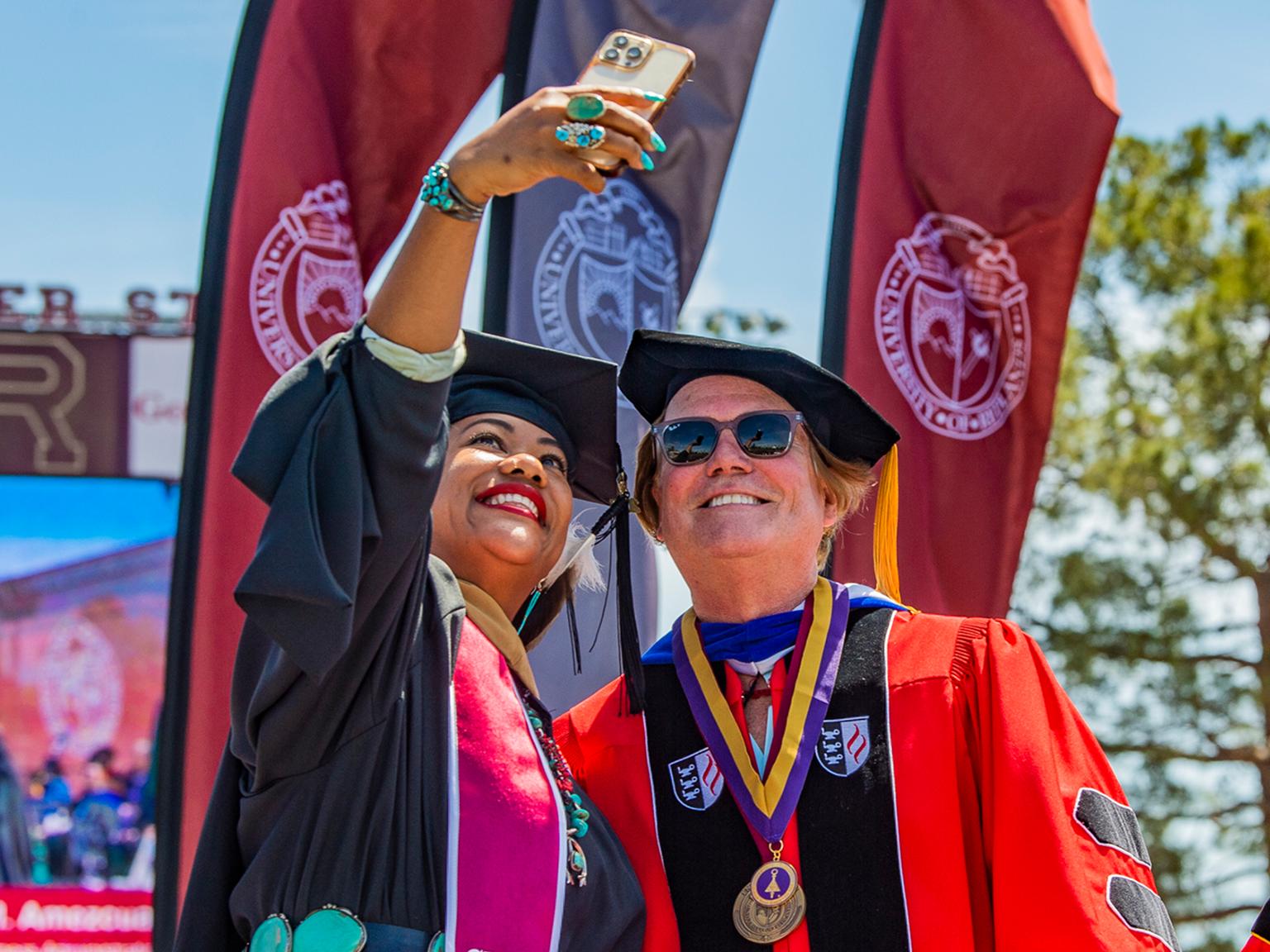Modalities
In-person, Online (synchronous)

Today’s organizations have multifaceted and immersive relationships with employees, customers, suppliers, and communities. With a Master of Science in Organizational Leadership degree from the School of Business & Society, you’ll learn to navigate these complex relationships, make ethical decisions, and integrate the arc of personal leadership, organizational, and societal influences to lay the foundation for success.
The MSOL program has been designed around two overlapping themes: the need to develop leaders with critical 21st-century business skills and the integration of purposeful leadership to implement these skills at the individual, group, organizational, and societal levels.
Through this program, you'll prepare personally and professionally for leadership. In Redlands MSOL program:
With the MSOL degree, you’ll have the organizational leadership skills that you need to manage teams, provide leadership training and executive coaching to help companies succeed, or serve as a business or organizational leader in your own right.
Priority 1 Deadline: January 15
Priority 2 Deadline: June 1
Priority 1 Deadline: October 1
Priority 2 Deadline: December 1
Priority 1 Deadline: February 1
Priority 2 Deadline: April 1




MSOL students are encouraged to participate in events and activities sponsored by the Purposeful Leadership Initiative. The Purposeful Leadership Initiative is an integrated education, research, and outreach enterprise that aims to positively affect leadership styles, skills, and approaches undertaken by students and professionals and to recognize and celebrate leaders in the community who practice purposeful leadership.
Students in MSOL courses are encouraged to apply for different awards open to them. Please see information on these awards below:
Students who complete MGMT 634 or MGMT 638 are eligible to apply for the Student Purposeful Leadership Award, which entails a certificate and an honorarium. These will be awarded by the Dean of the School of Business & Society in an official awards ceremony. To apply for the award, interested students will further develop their course project and submit a three-page supplementary report incorporating the initial steps they have taken to implement the action plan described in their course project. Course syllabi of the relevant courses will provide additional information needed.
All MSOL students are also eligible to apply for additional awards available through the Banta Center for Ethical and Purposeful Leadership.
There are a variety of experiential learning programs featuring international, domestic, and consultancy based allowing students to apply what their learning in class to the real world.
To view specific classes, program requirements, and coursework information, visit the current university catalog.
MGMT 633: Assessment of 21st Century Leadership Skills (1)
Orientation to and assessment of 21st century skills including improving performance with systemic thinking, supporting change, and adding value. Includes 360-degree assessment and personal assessment of management skills, management knowledge through a standardized test, and knowledge of business mathematics.
MGMT 634: Leading Individuals and Teams (4)
Managing individuals and teams is a graduate-level course that takes an application-oriented approach to managing and leading individuals and groups in organizations. Using in-class exercises, case analyses, and discussion-oriented lectures, students will increase their understanding of drivers of individual behavior, processes underlying motivation, rewards, and how to measure performance. Students will also learn the fundamentals of group dynamics, learn how to lead and participate in groups, manage conflict, and negotiate more effectively.
MGMT 635: Analytics for Managers (4)
This course provides a managerial overview of business analytics in the contemporary organization. Current/aspiring managers and consumers of analytics will learn about analytical approaches to managerial decision-making. Stages of analytical maturity and elements of analytical competitiveness will be examined to prescribe a road map for successfully deploying analytics in the organization.
MGMT 636: Leadership Communication (4)
This course provides advanced analytical approaches for strategic written, presentation, and interpersonal communication in organizational contexts. Focus on practical methods that advance leaders’ abilities to inform, engage, persuade, and influence professional audiences. Special attention paid to changing forms, formats, and culture in contemporary professional communication.
MGMT 637: Strategic Leadership and Management of Change (4)
This is a graduate-level course that takes an application-oriented approach to macro-organizational topics. Using case-based, discussion-oriented lectures and class exercises, students will learn how to lead and manage change in organizations, make more effective decisions, and navigate organizational power and politics. The course will also equip students with an understanding of how the fundamentals of organizational design and culture may be used to enhance organizational performance.
MGMT 638: Purposeful Leadership (4)
The course focuses on purposeful leadership, which emphasizes leadership effectiveness through the interwoven arc of our leadership domains: personal, relational, strategic, and societal. The course treats leadership and management as a liberal art in that it integrates concepts and models from psychology, sociology, philosophy, and organizational behavior. Through the process of reflective analysis (on the readings and discussions) as well as case study analysis, students will learn to explore the challenges and dilemmas that these leaders confronted and understand the importance of purposeful leadership in society.
MGMT 667: Business, Ethics, and Society (4)
This course is designed to provide students with an understanding of the broader social environment in which businesses and organizations operate as well as the ethical and legal responsibilities that managers owe to a variety of stakeholders. To serve these objectives, this course will examine issues such as corporate social responsibility, employee rights and duties, confidentiality, conflicts of interest, trust and honesty, acceptable consumer risks, environmental protection, organizational leadership, and the ethical dimensions of global trade and commerce.
MGMT 674: Human Resource Management (4)
Study and critical analysis of theory and practice of the human resource/personnel function in modern, complex organizations. Includes topics such as personnel policies, workforce diversity, HR practices, employee discipline, health and safety, and collective bargaining. Addresses goals of equity, efficiency, and effectiveness in a diverse environment.
MGMT 639: Reflection on 21st Century Leadership Skills (1)
Students reassess 21st century leadership skills assessed in MGMT 633 to determine whether or not they developed their skills during the MSOL program and what areas need further development. They create new learning goals and a plan to continue their growth as leaders after completion of the MSOL.


— Sierra Warwick ’23, MSOL
In-person, Online (synchronous)
Meet 1 evening per week
14 months, 9 courses, 30 credits
Awards/fellowships, Purposeful Leadership Initiative
Academic advising, career & professional development, extensive alumni network
Get in touch with our admissions team.